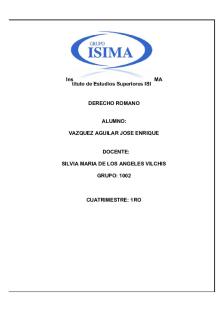Weber 1914 class status party student summary PDF

| Title | Weber 1914 class status party student summary |
|---|---|
| Author | Kiu Chun Chu |
| Course | Classical Sociological Theory |
| Institution | 香港中文大學 |
| Pages | 2 |
| File Size | 96.2 KB |
| File Type | |
| Total Downloads | 41 |
| Total Views | 130 |
Summary
The Distribution of Power within the Political Community: Class, Status, Party
Prof. Christian Greiffenhagen
Tutor Javior Pang...
Description
Student Summary: Weber, “The Distribution of Power within the Political Community: Class, Status, Party” [1914] A. Economically Determined Power and Status Order • • •
Definition of power Distinction and relationship between “power”, “economic power” and “social honor” Distinction and relationship between “legal order”, “status order”, “social order” and “economic power” and their influence on power and honor
B. Determination of Class Situation by Market Situation • •
•
•
Definition of “class” (related to market) The way that “life chance” is produced o in the process of exchange and distribution of property, two basic categories of all class formed, namely “property” and “lack of property” Within “propertied” and “propertyless”, can be further differentiated o Propertied (differentiated by kind of property): class of rentiers / entrepreneurs o Propertyless (differentiated by kind of service ): continuous / discontinuous service Class situation emerged from possession of goods is just beginning of formation of class; It is in cities, where credit market developed that class struggle begins. And class developed into status group. (this short paragraph is quite difficult to understand)
C. Social Action Flowing from Class Interest (contrast with Marx) • • • •
Class is economic interest involved in market Concept of class interest is ambiguous → different people may have different perceptions on class interest Class situation may lead to mass behavior, but whether this could lead to social action and association depends on cultural conditions Therefore, differences in life chances itself does not lead to class action, but only when certain conditions are met
D. Types of Class Struggle (I think this part is hard) • • • •
Emphasize that being at the same class does not necessarily leads to class action It is social actions among members of different classes that bring forth class situation Force from legal order allows the existence of capitalistic enterprise Transformation of class struggle
E. Status honor • •
Definition of status honor (easy to understand) Using some examples to show how the community determines the lifestyle and affect the stratification by status groups (convention and law)
F. Ethnic Segregation and Caste • • •
Extreme status group → closed caste Caste can be formed only when there are underlying ethnic difference Difference between status segregation in class and ethnic segregation
G. Status Privilege •
Stratification by status & monopolization of ideal and material goods or opportunities o A privileged and honorific status o Privileged status group has a disqualified attitude towards physical labor
H. Economic Conditions and Effects of Status Stratification •
Status order o Threatened when: mere economic acquisition and naked economic power still bear the stigma of its extra-status origin o Favored when: the acquisition and distribution of goods (market) is relatively stable
I. Parties (this part is easy) • •
Explain the role of “parties” Party and class...
Similar Free PDFs

Summary Party Politics In America
- 15 Pages

1880 1914
- 28 Pages

Weber
- 22 Pages

Student Template - good summary
- 12 Pages

Social class summary
- 2 Pages

STST1001 - Class summary
- 7 Pages

Class 19 Summary
- 1 Pages

Itaewon Class - Summary
- 4 Pages

IN Class Summary Revised
- 2 Pages

The Garden Party - Analysis
- 3 Pages
Popular Institutions
- Tinajero National High School - Annex
- Politeknik Caltex Riau
- Yokohama City University
- SGT University
- University of Al-Qadisiyah
- Divine Word College of Vigan
- Techniek College Rotterdam
- Universidade de Santiago
- Universiti Teknologi MARA Cawangan Johor Kampus Pasir Gudang
- Poltekkes Kemenkes Yogyakarta
- Baguio City National High School
- Colegio san marcos
- preparatoria uno
- Centro de Bachillerato Tecnológico Industrial y de Servicios No. 107
- Dalian Maritime University
- Quang Trung Secondary School
- Colegio Tecnológico en Informática
- Corporación Regional de Educación Superior
- Grupo CEDVA
- Dar Al Uloom University
- Centro de Estudios Preuniversitarios de la Universidad Nacional de Ingeniería
- 上智大学
- Aakash International School, Nuna Majara
- San Felipe Neri Catholic School
- Kang Chiao International School - New Taipei City
- Misamis Occidental National High School
- Institución Educativa Escuela Normal Juan Ladrilleros
- Kolehiyo ng Pantukan
- Batanes State College
- Instituto Continental
- Sekolah Menengah Kejuruan Kesehatan Kaltara (Tarakan)
- Colegio de La Inmaculada Concepcion - Cebu





